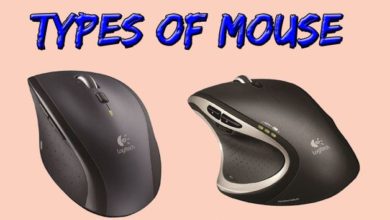Analog Vs Digital Computer
Table of Contents
There are two different types of computers i.e analog and digital computers. Historically, analog computers have been widely used, but are less popular today. The main difference between analog and digital computers is that analog computers work with continuous signals, while digital computers can only work with discrete signals.
The main difference between analog and digital computers is how they handle and process the data. Digital computers function by receiving & computing data converted in binary form (0 and 1) while Analog computers function continuously, no matter what the variations are in the input i.e temperature, current.
Do You Know The Difference Between:
What is Analog Computer?
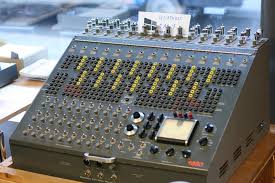
An Analog computer is a type of computer which functions continuously, no matter what the variations are in the input. These variations may include instability in current, temperature, electric, and mechanical parts. The best examples of an analog computer are Oscilloscopes, thermostats, and thermometers.
Try This
In the beginning, the analog computer was mostly used for the purpose to calculate the electrical signal, voltage, resistance of the capacitor, etc. It is not easy to work with an analog computer. Large `numbers of electrical, mechanical peripheral, and supporting devices are needed in order to function accurately.
What is Digital Computer?
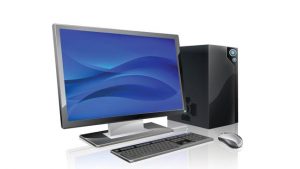
The digital computer is a type of computer which receives and computes the data converted in binary form. The digital computer gets input and functions in a discrete manner also. So, the Input may consist of letters, digits represented in binary language.
The binary code consists of two basic digits 0 and 1. These two digits stand for true and false, no and yes, left or right. It is most commonly used in all fields of life. Generally, it is an electronic device. The major types of digital computers are:
- Personal Computers/ Microcomputers
- Minicomputers (midrange computers)
- Mainframe computers
- Supercomputers
- Servers
- Workstations
- Embedded computers
- Desktop Computers
- Hybrid computers
Difference Between Analog And Digital Signal
An analog signal is any continuous signal which has variable time intervals. That is, for example, one signal at a time is slightly different from the upcoming signal. The analog signal is different from the digital signal in the tiny fluctuations that happen in the signal.
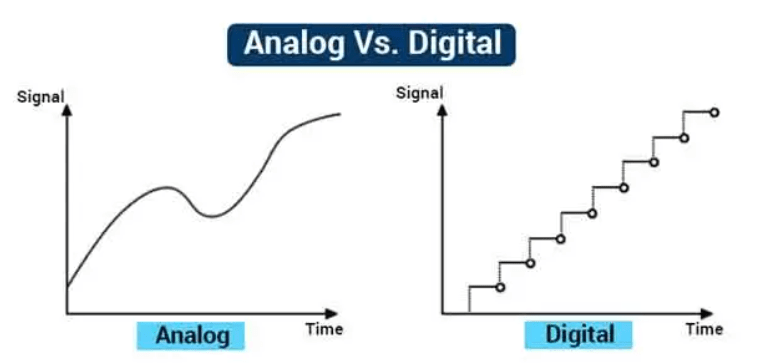
Digital signals use a discrete or discontinuous set of values, while non-digital (or analog) systems use a wide range of values to show information. Although digital representations are discrete in nature, the information provided can be separated, either in the form of numbers and letters, or in continuous forms, such as image, text, sound, and other measurements of continuous systems.
Difference Between Analog And Digital Computer in Table Form
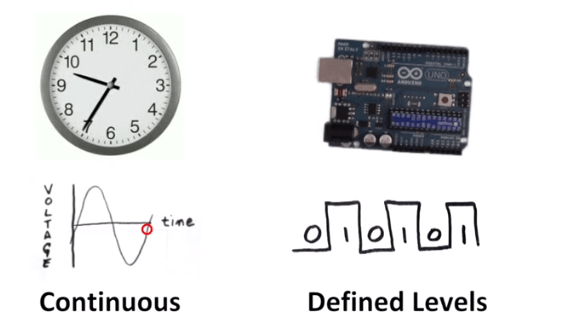
Here we enlist some important differences which separate an analog computer from a digital computer.
Digital Computer Vs Analog Computer |
||
| Signal | Digital signals are random and discrete signals generated by virtual modulation | Analog signals are non-stop sign that shows physical measurements |
| Data Manipulation | Digital computers are those computers that manipulate data in binary form. i.e 0 & 1 | Analog computers are those that work with natural phenomena |
| Waves | The Waves marked with square waves | Waves marked with sine waves |
| Provide information | Use discrete or discontinuous values to display information | Use continuous spectrum to display information |
| Storage | Has high storage capacity | Has no storage capacity |
| Samples | The human voice in the air, analog electronic devices | Computers, CDs, DVDs, and other digital electronic devices |
| Technology | Converts and records analog samples within the shape of wavelengths to a finite set of numbers | Analog technology records wavelengths as they’re |
| Data Transmission | The Data is secure in the transmission or read/write cycle | Data is subject to quality degradation in the transmission or read/write cycle |
| Task Support | Perform multiple tasks | Perform particular tasks, no multitasking supportive |
| Reaction To Noise | Because of the noise response in digital technology, accuracy is less affected | Is more likely to reduce accuracy |
| Flexibility | Digital hardware is much more flexible when running | Analog hardware is not flexible while running |
| Output | These computers produce output on screen or piece of paper | Outputs from analog computers are in the form of graphs signals movements |
| Uses | The best option for digital computing and electronic devices | This technology can only be used on analog devices and is a very suitable option for transmitting audio and video information |
| Softwares | Personal computers, Pocket PCs | Thermometer |
Bandwidth |
There is no guarantee that digital signal processing will be done immediately and promptly; For this reason, this technology uses more bandwidth to carry information | Analog signal processing can be done immediately and consumes less bandwidth |
| Memory | Information is stored in binary form | Information is stored in the form of a wave signal |
| The Power | Digital devices consume less power | Analog devices require extra power and energy |
| Cost | Costly and difficult to move | Less Expensive and portable |
| Impedance | Above 100 megohms | Down |
| Errors | Digital tools are free of visual errors such as parallax errors and approximate errors | Analog devices usually have a scale that has low performance and therefore shows significant visual errors |
| Examples | An example is our Desktop Personal Computer | Examples are speedometers in cars & wristwatch |
Similarities Between Analog and Digital Computer
1:- The similarity between analog & digital Computers is that the starting and ending pairs are in the form of an electronic signal. That is, it may be current or voltage.
That 0 and 1 is actually may be current or voltage (depending on the condition and the circuit). Only in digital circuits, that current or voltage is discrete in time, but the analog signal is always continuous
2:- One more thing to understand is that the digital circuits and components are constructed using analog components themselves. For example, an IC that understands only 0 and 1 is full of many transistors, while resistors, as well as capacitors, are also used sometimes.
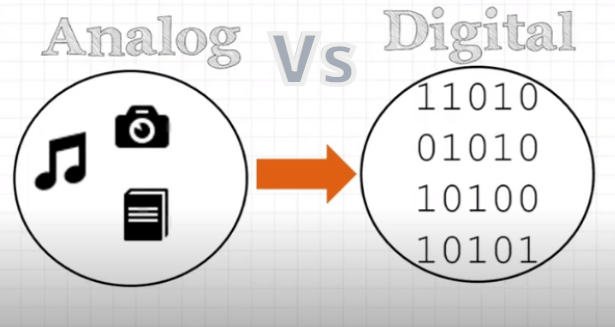
Transistors, resistors, and capacitors are actually analog parts, but with different settings and special designs, they become converted into digital circuits.
3:- We can also convert digital and analog signals. There is a huge collection of converters that do this. For example, converting HDMI to VGA contains a digital-to-analog converter inside. Because VGA is an analog system and HDMI is a digital system.
For example, in a mobile phone, an analog-to-digital converter is used because the human voice is actually in the form of analog signals and must be digital in order to be easily transmitted. Many places use digital to analog converters or vice versa.
Other Common Difference { Analog Vs Digital}
- Accurate result
- Output Devices
- Electronic Circuits
- Working Pattern
- Functioning
- Usage
- Memory
- Noise or Disturbance Problem
Accurate Result
Digital technology is the latest and more modern than analog technology but analog technology still produces more exact and accurate output as compared to digital.
Output Devices
The digital computer displays result of input on screens like monitors, LCD, or LED while the analog computer shows the results in the form of voltage signals and reading on the attached meters.
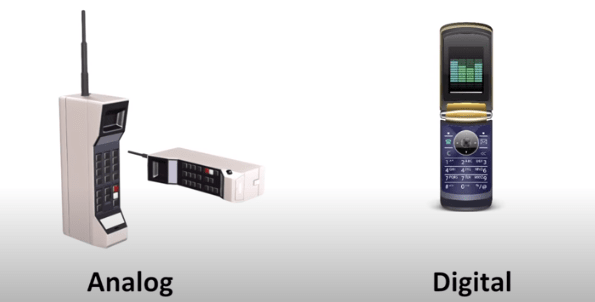
Electronic Circuits
When we talk about electronic circuits, the digital computer almost uses two switches on and off. While on the other hand analog computer uses signals generators, operational amplifiers, and several resistors for continuous signals flow.
Working Pattern
The digital computer evaluates and executes work in a discrete way. However analog computer generates results in a continuous way.
Functioning
Due to advancements in technology, the digital computer is now also capable of performing functions of analog computers but an analog computer does not have the ability to perform the function of a digital computer.
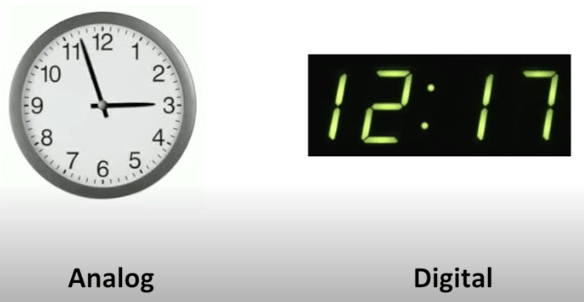
Usage
Digital computers are commercially suitable and useable all over the world. The use of digital computers is most compared to analog computers.
Memory
The digital computer does not have any memory such as a disc, drive, chip, etc. However digital computer almost requires memory like hard disk, flash storage, or memory chips in order to function properly.
Noise or Disturbance Problem
While measuring environmental accuracy, noise can also affect the accuracy of the analog computer. But noise and disturbance cannot affect the digital computer.
Conclusion:
Both analog and digital computers have their own importance. In some situations, they can be replaced with each other due to their similarities. however, they both are completely different in their work and characteristics.
we hope you enjoyed this article. Plz, don’t forget to share with your besties. still, have any queries! feel free to let us know in the comment section.


